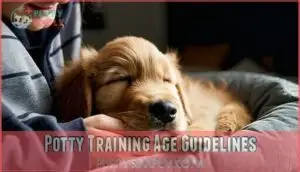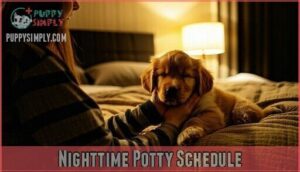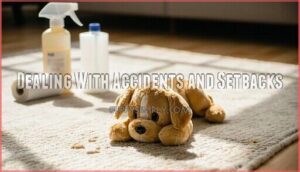This site is supported by our readers. We may earn a commission, at no cost to you, if you purchase through links.

Puppies under 4 months old usually can’t hold their bladders overnight, so a nighttime potty break helps prevent accidents and teaches good habits.
Set an alarm for every 2-4 hours, depending on their age, and quietly take them outside—no playtime, just business.
Keep lights low and your tone calm so they learn it’s not a time for fun, and over time, their bladder capacity grows, and you can stretch the intervals, which requires patience.
Patience now pays off with a well-trained pup later!
Table Of Contents
- Key Takeaways
- Potty Training Age Guidelines
- Nighttime Potty Training Techniques
- Managing Nighttime Potty Challenges
- Waking Puppy Up to Pee
- Nighttime Potty Schedule
- Crate Training and Sleeping Area
- How Often to Wake Puppy
- Transitioning Away From Nighttime Wakes
- Dealing With Accidents and Setbacks
- Long-Term Potty Training Success
- Frequently Asked Questions (FAQs)
- Can a puppy be woken up to pee at night?
- Should you wake a 7 month old puppy to Pee at night?
- How do you stop a puppy from peeing at night?
- Should you wake up a 12-16 week old puppy to Pee?
- How often should I Wake my puppy up to potty?
- Should I Wake my puppy up at night?
- Should you wake a sleeping puppy to pee?
- What is the 10-10-10 rule for puppies?
- Should I wake my old dog up to pee?
- How often should I wake up to let my puppy out?
- Conclusion
Key Takeaways
- Wake your puppy up to pee every 2-4 hours for those under 4 months old to prevent accidents and establish good habits.
- Keep nighttime potty breaks quick, quiet, and focused to teach your pup it’s not a time for play.
- Limit water intake 2 hours before bedtime and stick to a consistent sleep and potty schedule for better bladder control.
- Gradually extend the time between nighttime breaks as your puppy grows to help them build independence and sleep through the night.
Potty Training Age Guidelines
Understanding your puppy’s potty training needs by age is vital for building good habits and preventing accidents.
Each stage of development brings changes in bladder control, so adjusting your approach over time guarantees success.
Complete concepts and preventing accidents.
1. 8 Weeks Old Puppies
During their 1-8 weeks, puppies have weak bladder control, needing potty breaks every 1-2 hours.
Since maternal care heavily influences feeding and habits, stick to a puppy training schedule. Plan nighttime potty breaks to match their sleep schedule.
Early habits shape long-term success, so prioritize frequent outings. Don’t expect newborns to hold it long—consistent care is key, and it is crucial for long-term success.
9. 12 Weeks Old Puppies
At 9-12 weeks, your puppy’s potty habits are improving as bladder control strengthens.
Stick to a consistent nighttime potty break schedule to avoid accidents.
Use these effective training methods:
- Take your puppy out every 2–3 hours.
- Offer breaks right before bedtime.
- Limit water intake two hours before sleep.
- Keep nighttime trips quick and focused.
12. 16 Weeks Old Puppies
At 12-16 weeks, your puppy’s bladder muscles are growing stronger, making it the perfect time for structured potty training.
At 12-16 weeks, developing bladder strength makes structured potty training the ideal step toward long-term success and accident-free habits.
Stick to a nighttime wake schedule, ensuring breaks every 2-3 hours.
Introduce potty training commands during these trips.
Use a properly sized crate to support accident prevention.
Consistency in your puppy sleep schedule will prevent setbacks and build confidence.
4. 7 Months Old Puppies
At 4-7 months, your puppy’s bladder strength improves, cutting down nighttime accidents.
But, don’t skip breaks just yet—potty regression happens! Keep training consistent and monitor breed differences.
- Stick to a puppy sleep schedule with a bedtime potty trip.
- Watch for restless cues at night.
- Limit water intake before bed.
- Make certain puppy potty training stays consistent.
7+ Months Old Puppies
By 7 months, your dog’s bladder control matures, meaning most pups can sleep through the night without a potty break.
By seven months, most dogs master nighttime bladder control, eliminating the need for potty breaks and ensuring uninterrupted sleep.
However, watch for exceptions like marking behavior, regression causes, or medical issues.
Small breeds and certain health conditions might need adjustments to the dog pee schedule.
Stick to a consistent dog potty routine, balancing puppy potty training with their natural needs.
Nighttime Potty Training Techniques
When it’s time to tackle nighttime potty training, setting up the right routine can make all the difference.
By planning carefully and staying consistent, you’ll help your puppy build good habits and avoid accidents during the night, which is crucial for successful nighttime potty training.
Create Bedtime Routine
A consistent bedtime routine helps your puppy settle and reduces nighttime potty breaks.
Stick to these steps:
- End playtime with a bathroom trip outside.
- Create a cozy sleeping space.
- Remove water two hours before bed.
- Use calming cues like dim lights.
- Take your puppy out one last time before sleep.
This routine builds comfort and consistency!
Monitor Signs of Needing to Go
Keep an eye out for restlessness signs or whining cues, as these often signal your puppy needs a nighttime potty break.
Pay attention to sleep disturbances, like sudden sniffing or body language shifts.
Changes in vocalizations may also mean it’s time.
Learning your puppy’s behavior helps avoid accidents and creates consistency with fewer wake-ups over time.
Clean Accidents Thoroughly
When accidents happen, act fast for proper sanitation.
Clean thoroughly with enzyme cleaners to break down tough odors and prevent stains. Odor removal is key—residual smells can confuse your puppy.
Consider using puppy-specific enzyme products for best results. Choose enzymatic cleaners designed for puppy accidents to keep your home fresh and your training on track.
Remember, diligent cleaning supports successful puppy training and stops repeat incidents, which is why proper sanitation is crucial.
Restrict Water Intake Before Bed
An easy tip for puppy training: manage water intake before bed to avoid nighttime potty breaks and puppy accidents.
Aim for hydration balance while supporting kidney health and dog bladder control.
Try this:
- Remove water 2-3 hours before sleep.
- Promote daytime hydration to avoid dehydration risks.
- Offer a final drink early evening.
- Observe thirst management cues for sleep quality.
To ensure effective puppy training, it is crucial to follow these guidelines carefully and maintain a healthy routine.
Managing Nighttime Potty Challenges
Handling nighttime potty challenges requires patience and a clear routine.
By addressing factors like age, health, and diet, you can manage your puppy’s needs effectively while ensuring everyone gets adequate rest.
Senior Dogs and Weaker Bladders
Senior dogs often struggle with weaker bladders due to aging or medical conditions like incontinence.
Dog bladder control declines, causing nighttime challenges.
Management strategies include adjusting their routine with comfortable sleeping areas, nighttime aids like absorbent pads, and veterinary attention for dog health.
Medication options can help, but consult your vet to address dog medical conditions effectively and guarantee your furry friend’s comfort.
UTIs and Frequent Urination
Sometimes frequent potty breaks aren’t about training.
Urinary tract infections (UTIs) can mimic poor habits, causing frequent accidents.
Watch for UTI symptoms like strong-smelling urine or excessive licking.
Prompt vet care guarantees bladder health and kidney function.
Puppy medical conditions, like UTIs, may need medication options.
Spot concerns early to avoid setbacks in puppy training and protect their overall health.
Diet and Bathroom Needs
Your puppy’s diet plays a big role in their bathroom habits.
High-water-content food leads to frequent urination, while fiber-rich meals promote regular digestion.
Manage puppy water intake by offering adequate hydration during the day but limiting it before bed.
Balanced nutrition supports bladder control, making potty training easier.
Monitor your puppy’s food and water routine to match their potty needs, ensuring regular digestion is maintained.
Waking Puppy Up to Pee
Waking your puppy up to pee at night can be a vital part of early potty training, especially for younger pups with small bladders.
By following age-appropriate guidelines, you’ll help prevent accidents and support healthy bathroom habits.
1. 8 Weeks Old Puppies at Night
Newborn puppies, between 1-8 weeks old, have weak bladder muscles and little bladder control, requiring hourly potty breaks.
At this puppy age, maternal assistance or using diapers may help manage accidents. Expect frequent nighttime potty breaks as part of their puppy sleep patterns.
Urinary tract infections can also worsen incontinence. Keep it simple—respond to whines promptly, ensuring your puppy wake up schedule supports their needs effectively, with a focus on puppy sleep patterns and hourly potty breaks.
9. 12 Weeks Old Puppies at Night
By 9-12 weeks, your puppy’s bladder control improves, but they still need frequent nighttime potty breaks.
Set a consistent sleep schedule, limit water intake, and watch for potty regression. Breed differences may affect how long they hold it.
If your puppy wakes up whining, take them out quickly—no games, just business—to prevent accidents and reinforce healthy puppy sleep patterns. Some dogs may experience urinary incontinence later, so monitor their habits to prevent urinary incontinence.
12. 16 Weeks Old Puppies at Night
At 12-16 weeks, your puppy starts developing better bladder control but still needs a nighttime potty break.
Here’s what to do:
- Set alarms for middle-of-night breaks.
- Stick to a consistent sleep schedule.
- Use a crate sized just right for comfort.
- Focus on crate training your puppy gently.
Watch for signs of potty training regression overnight, as some puppies may experience urinary incontinence issues that require veterinary attention.
4. 7 Months Old Puppies at Night
At 4-7 months, your puppy’s bladder control improves, often reducing nighttime potty breaks.
Stick to a consistent schedule and observe for any sleep regression. Breed differences mean smaller dogs may need extra trips. Manage hydration timing carefully within your puppy nighttime routine.
Every pup is unique, so adjust as needed for successful puppy training nighttime habits.
See the table below for quick tips:
| Aspect | Tip |
|---|---|
| Bladder Control | Typically holds 4-6 hours at night. |
| Sleep Regression | Adjust breaks if accidents happen. |
| Breed Differences | Small breeds may need more trips. |
| Hydration Timing | Stop water 2 hours before bedtime. |
| Consistent Schedule | Potty before bedtime, first thing morning. |
Nighttime Potty Schedule
A consistent nighttime potty schedule is key to helping your puppy build reliable bathroom habits and avoid accidents.
By ensuring regular breaks based on your puppy’s age and needs, you’ll set them up for long-term success.
Take Outside to Pee
When waking a puppy to pee, take them straight to a designated spot.
Use a leash to avoid distractions and calmly give the potty command.
Keep the trip quick, silent, and focused—no playtime.
Reward success with gentle praise to reinforce habits.
This steady nighttime potty routine helps minimize accidents and supports smooth puppy potty training.
Consistent training also requires establishing a routine for the puppy to follow a routine.
Carry Him Outside to Pee
Carrying your puppy outside during nighttime potty breaks minimizes distractions, encourages holding, and helps with bladder control. It prevents accidents on the way out and reduces stimulation that might wake them further.
Follow these tips for success:
- Carry them straight to their potty spot.
- Use a calm tone and command like “Go potty.”
- Avoid playtime to reinforce focus.
Use Puppy Pads
If carrying your puppy outside feels impractical, puppy pads can be a helpful tool in potty training.
Place pads in a consistent spot with good absorbency levels and odor control. Select pads with durable material to prevent messes.
Consider buying quality pads for effective house training. While pads aid house training, focus on a smooth training progression by gradually reducing their use as your puppy progresses, aiming for a smooth training progression.
Crate Training and Sleeping Area
A proper crate setup is essential for creating a safe and comfortable sleeping space that promotes good potty habits.
By choosing the right size and maintaining a clean area, you can help your puppy feel secure while avoiding nighttime accidents.
Crate Training Success
Set your puppy up for crate training success by introducing the crate as a cozy den. Use positive reinforcement to make them feel safe.
Make certain the crate size allows them to lie comfortably without too much space. For help, you can find essential crate training tools online.
Follow these tips:
- Start with slow crate introduction.
- Reward calm crate behavior.
- Stick to cleaning protocols.
- Prevent separation anxiety gently.
- Consistency builds trust.
Avoiding Accidents in Crate
To avoid accidents, make certain the crate size is just right—roomy enough to turn around but snug to discourage using one corner as a bathroom.
Skip bulky bedding if accidents happen, as it absorbs mess.
Clean thoroughly with pet-safe products to remove odors.
Stick to a consistent routine for crate training, pairing nighttime potty breaks with positive reinforcement.
Deciding on Puppy Pads
If your puppy’s accidents are constant, puppy pads can save your sanity.
Choose wisely by considering these factors:
- Pad Material: Soft enough for paws, durable for use.
- Size Matters: Larger pads suit bigger puppies or messy ones.
- Absorbency Levels: Prevents leaks completely.
- Odor Control: No one loves lingering smells.
- Environmental Impact: Look for biodegradable options.
Effective for temporary potty training needs!
How Often to Wake Puppy
Knowing how often to wake your puppy at night depends on their age and ability to hold their bladder.
Younger puppies need more frequent breaks, but you can gradually reduce nighttime interruptions as they grow.
Frequency of Nighttime Breaks
The frequency of nighttime potty breaks depends on your puppy’s age-based bladder control development.
Younger pups might need frequent nighttime breaks, usually every 2-3 hours, while older ones can go longer.
Consider individual puppy needs, medical considerations, and routine adjustments.
Waking a puppy to pee guarantees success, but gradually, they’ll manage longer stretches as their bladder strengthens, which is crucial for their overall development and routine adjustments.
Age and Individual Needs
A puppy’s age, size, and breed bladder control shape how often they need nighttime potty breaks.
Smaller breeds or younger puppies might need more attention, while older pups manage longer stretches.
Individual needs vary—training progress, medical history, and development all play a role.
Pay attention to your puppy’s habits to tailor their schedule for age-specific success.
Increased urination could also point to a possible UTI, so it’s important to monitor your puppy’s health and watch for signs of a potential UTI.
Gradually Decrease Nighttime Wakes
As your puppy gets older, you’ll start extending intervals between nighttime potty breaks.
Monitoring progress is key—gradually increase the time to encourage independence. Stick to a consistent puppy nighttime routine, and make small routine adjustments as needed.
With consistent puppy training, eliminating wakes becomes easier. Waking your puppy to pee less often signals they’re mastering potty training like a pro, which indicates they are becoming more independent.
Transitioning Away From Nighttime Wakes
As your puppy grows, it’s important to gradually phase out those nighttime potty breaks to support consistent sleep.
By building a steady routine, encouraging more independence, and tracking progress, you can help your puppy move smoothly into a new phase of development, supporting consistent growth and adjustment.
Establishing Consistent Routine
To build a consistent routine, stick to a predictable puppy nighttime routine.
Start with:
- Consistent Bedtime: Choose the same time nightly to settle down.
- Scheduled Potty: Take your pup out before sleep.
- Fixed Command: Use a single phrase like "Go potty" for clarity.
- Tracking Needs: Adjust the potty training schedule as your puppy grows.
These steps simplify puppy potty training.
Encouraging Independence
Gradually encourage independence by introducing Self-Soothing Techniques and extending time between nighttime potty breaks.
Allow Independent Playtime during the day to build confidence. Stick to a consistent routine, reducing dependency on your presence.
Use Positive Reinforcement when your puppy handles more freedom well. Gradual Freedom helps them move from waking to pee to managing potty needs independently, improving nighttime habits.
Monitoring Progress
Tracking potty training progress is key as your puppy grows.
Watch for changes in sleep patterns or accident frequency and adjust the schedule for better bladder control.
Here’s how:
- Keep a log of accidents to spot trends.
- Consult a professional if setbacks occur.
- Stay consistent with the training timeline to encourage long-term success.
Tracking progress and making adjustments are crucial for better bladder control in puppies.
Dealing With Accidents and Setbacks
Accidents are a normal part of potty training, and they don’t mean you’re failing.
By staying consistent and adjusting your routine as needed, you can help your puppy get back on track quickly.
What to Do if Puppy Pees in Crate
When your puppy pees in the crate, don’t panic—it’s an opportunity to course-correct. Clean the mess with enzyme cleaners to nix odors, reduce anxiety, and prevent re-soiling.
Check crate size; too big invites accidents. Use puppy pads temporarily for younger pups. Consult a vet if medical issues linger.
Stick to consistent crate training and potty routines. This approach helps in preventing accidents and makes the training process smoother.
| Issue | Solution | Tools Needed |
|---|---|---|
| Crate too large | Resize with a crate divider | Crate divider or smaller crate |
| Odor remains | Use enzymatic cleaners | Enzyme-based cleaner |
| Frequent accidents | Vet consult or pad training | Veterinarian, puppy pads |
How to Prevent Accidents
Supervise closely during potty training to prevent accidents.
Stick to a consistent routine with scheduled breaks, especially at night. Limit water a couple of hours before bedtime, ensuring your puppy isn’t waking up unnecessarily.
Crate training can help, as dogs avoid soiling their sleeping area.
Use enzyme cleaners for accidents to eliminate odors and reinforce good puppy nighttime habits, helping to establish good puppy behavior and prevent accidents with consistent routine.
Adjusting Routine as Needed
Adjusting your routine is essential when nighttime potty breaks aren’t working.
Use these tips:
- Schedule Flexibility: Shift potty times based on behavior.
- Observation Skills: Watch for accidents or new signals.
- Regression Handling: Return to basics during setbacks.
- Dietary Adjustments: Modify meals to reduce late urgency.
- Medical Considerations: Consult a vet for frequent accidents.
Consistency helps puppies thrive!
Long-Term Potty Training Success
Long-term potty training success starts with consistent habits and a focus on meeting your puppy’s needs as they grow.
Stick to a routine, provide plenty of daytime bathroom breaks, and seek professional guidance if challenges arise, which is crucial for long-term success.
Prioritizing Sleep and Well-being
Balancing your puppy’s rest and your own is key.
Gradual adjustments to nighttime potty breaks help avoid sleep deprivation while building consistent sleep patterns.
A solid bedtime routine guarantees both of you get necessary rest.
Prioritize your wellbeing—it’s okay to focus on your sleep too.
Over time, your puppy’s sleep patterns will improve, reducing the need for waking puppy at night.
Consistent Daytime Bathroom Breaks
During the day, stick to a consistent potty schedule to reinforce habits.
Regular breaks improve bladder control, prevent accidents, and support long-term success.
Puppies thrive on routine—take them out after meals, naps, and playtime.
A steady schedule sets the stage for housebreaking tips that work and minimizes nighttime disruptions.
Daytime frequency is your secret weapon for puppy training victories and helps with bladder control.
Consulting Professionals for Advice
If your puppy’s progress feels stuck, reach out to professional trainers or veterinarians.
They can craft personalized potty plans or spot underlying medical condition impacts.
For breed-specific needs or training regression support, consult a certified animal behavior consultant or veterinary behaviorist.
Their expertise helps tackle tricky behavioral issue help, building confidence and consistency during your puppy’s potty training journey.
Frequently Asked Questions (FAQs)
Can a puppy be woken up to pee at night?
Think of a puppy’s bladder like a tiny water balloon—it can’t hold much when they’re young.
Waking them at night to pee is okay, especially under 4 months, to avoid accidents and encourage habits.
Should you wake a 7 month old puppy to Pee at night?
At 7 months, most puppies can hold their bladder through the night without waking.
If they’re healthy and trained, there’s no need to wake them—let them sleep unless there’s a medical concern.
How do you stop a puppy from peeing at night?
As the saying goes, "An ounce of prevention is worth a pound of cure."
Limit water before bed, make certain of a last potty break, crate train, and establish a routine to prevent nighttime accidents, following the idea that prevention is key.
Should you wake up a 12-16 week old puppy to Pee?
Yes, at 12-16 weeks, it’s smart to wake them every 2-3 hours at night for potty breaks.
Their bladders are still growing, and this helps prevent accidents and reinforces good habits.
How often should I Wake my puppy up to potty?
Wake your puppy up to potty every 3-4 hours if they’re under 4 months old, depending on their age.
As they grow, extend the time between breaks to encourage bladder control and better sleep.
Should I Wake my puppy up at night?
Ever tried holding it all night?
Puppies can’t.
Until they’re at least 4 months old, wake them for a quick potty break.
It’s temporary, but it saves accidents and reinforces good habits.
Should you wake a sleeping puppy to pee?
If your puppy is under 4 months old, it’s smart to gently wake them for a nighttime potty break.
Puppies can’t hold it long and this helps prevent accidents and build good habits.
What is the 10-10-10 rule for puppies?
The "10-10-10 rule" for puppies focuses on structure: 10 minutes of focused potty time outdoors, 10 minutes of supervised freedom indoors, and 10 minutes of resting to encourage healthy habits and predictable routines.
Should I wake my old dog up to pee?
Imagine your dog dreaming peacefully—they mightn’t need nighttime potty breaks unless medical issues or accidents persist.
If there’s a health concern or recent changes, plan a quick, quiet trip to avoid mishaps.
How often should I wake up to let my puppy out?
You should wake your puppy every 2-3 hours at 12 weeks old since their bladder control is limited.
Adjust the timing based on their age, slowly stretching the intervals as their bladder strengthens.
Conclusion
Think of nighttime potty training as planting seeds for a well-trained, happy dog.
Waking your puppy up to pee may feel inconvenient now, but it’s essential for building lasting habits. With patience and consistency, your puppy learns bladder control while avoiding accidents that set training back.
Follow age-appropriate guidelines, stick to routines, and adjust based on your pup’s growth. Those nighttime efforts teach independence, ensuring long-term success and happier nights for you and your furry friend.
- https://www.petplace.com/article/dogs/pet-care/what-to-expect-from-your-8-week-old-puppy/
- https://www.kinship.com/dog-health/how-long-can-puppies-hold-their-pee
- https://porchpotty.com/blogs/news/how-long-can-puppies-hold-their-pee
- https://ultimatepuppy.com/house-training/teaching-your-puppy-to-hold-it/
- https://www.thekennelclub.org.uk/health-and-dog-care/health/health-and-care/a-z-of-health-and-care-issues/why-does-my-puppy-pee-so-much/




















